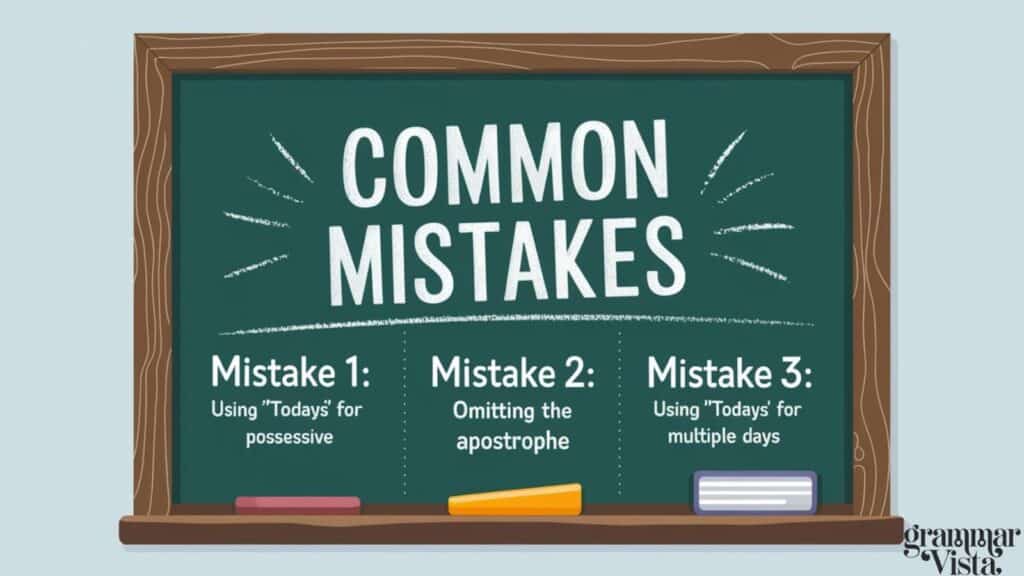Ever stumbled over whether to write “today’s” or “todays” when referring to the current day? You’re not alone. This common conundrum trips up even seasoned writers. Let’s dive into the nitty-gritty of this grammatical puzzle and clear the air once and for all. No need to create a mess, just think and choose the most suitable word “Today’s or Todays” wisely. If you’re looking to expand your vocabulary, check out WordsLibrary that can help refine your writing skills.
In today’s digital age, capturing and sharing beautiful photos has become more important than ever. Whether you’re a hobbyist or a seasoned photographer, finding the right tools to edit and perfect your images can be a game-changer. Photoszilla offers a range of editing options, from basic adjustments to intricate enhancements, making it a versatile choice for all your photo editing needs.
The Singular Possessive: Today’s

“Today’s” is the correct form when you’re talking about something belonging to or associated with the present day. It’s the singular possessive of “today.” Think of the apostrophe as a little flag saying, “Hey, ownership ahead!”
For example:
- Today’s weather is scorching.
- I can’t believe today’s news!
- What’s on today’s agenda?
In each of these cases, we’re referring to something specific to this very day. The weather, news, and agenda all belong to today, hence the apostrophe-s.
The Plural Form: Todays

Now, “todays” without an apostrophe is technically incorrect. You might be wondering, “Why would anyone even consider using this form?” Well, it’s a common mistake stemming from confusion about plural forms.
Let’s be clear: there’s only one today. You can’t have multiple todays (unless you’re stuck in a time loop like Bill Murray in “Groundhog Day”). Therefore, “todays” as a plural doesn’t make sense in standard English.
Read More about Business’ or Business’s?
When to Use Today’s: Real-World Scenarios
- Describing Current Events
“Today’s headlines are all about the new tech breakthrough.” - Referring to Schedules
“Today’s meeting has been postponed.” - Discussing Trends
“Today’s fashion is all about sustainability.” - Commenting on the Present Moment
“Today’s opportunities shape tomorrow’s successes.”
Common Mistakes and How to Avoid Them

Mistake 1: Using “Todays” for Possessive
❌ “Todays special is spaghetti carbonara.”
✅ “Today’s special is spaghetti carbonara.”
Mistake 2: Omitting the Apostrophe
❌ “I can’t keep up with todays rapid changes.”
✅ “I can’t keep up with today’s rapid changes.”
Mistake 3: Using “Todays” for Multiple Days
❌ “The todays of this week have been hectic.”
✅ “The days this week have been hectic.”
Expert Insights on Language Mastery
Achieving language mastery isn’t just about memorizing rules. It’s about understanding the logic behind them. The apostrophe in “today’s” serves a crucial function: it indicates possession. This grammatical structure is consistent with other singular nouns in English.
Consider these parallels:
- The dog’s bone (belonging to one dog)
- The cat’s toy (belonging to one cat)
- Today’s challenge (belonging to or associated with today)
By grasping this concept, you’re not just learning a single rule, but a fundamental principle of English grammar.
You might be interested in 15 Other Ways to Say “I Hope You Had a Great Vacation”
The Broader Context: Possessives in English
Understanding “today’s” vs. “todays” is part of a larger skill set in English: mastering possessives. Here’s a quick rundown:
- Singular Nouns: Add ‘s
- The book’s cover
- The child’s toy
- Plural Nouns Ending in S: Add just the apostrophe
- The dogs’ bones
- The cats’ toys
- Irregular Plurals: Add ‘s
- The children’s playground
- The mice’s cheese
Practical Tips for Clear Communication
- Read It Aloud: If you’re unsure, read your sentence out loud. Does it sound like you’re indicating possession? If so, you probably need that apostrophe.
- Substitute Another Word: Replace “today’s” with another singular possessive. If “the dog’s” fits grammatically, you’re on the right track.
- Consider Context: Are you talking about something specific to this day? That’s a clue you might need “today’s.”
- Avoid Using “Todays”: Remember, this plural form isn’t standard in English. If you find yourself wanting to use it, rethink your sentence structure.
Multiple Days: When “Today” Isn’t Enough
Sometimes, you might want to talk about more than one day. In these cases, avoid using “todays” and consider these alternatives:
- “These days, technology is advancing rapidly.”
- “In recent days, we’ve seen significant changes.”
- “Over the past few days, I’ve noticed an improvement.”
The Possessive of Today in Different Contexts
- In Journalism
“Today’s top story: breakthrough in renewable energy.” - In Business
“Today’s market fluctuations are unprecedented.” - In Education
“Today’s lesson will focus on apostrophe usage.” - In Social Media
“What’s your take on today’s trending topics?”
Why It Matters: The Impact of Proper Grammar
You might wonder, “Does it really matter if I use ‘today’s’ or ‘todays’?” The answer is a resounding yes! Proper grammar is crucial for:
- Professionalism: In business communications, correct grammar can be the difference between landing a client and losing credibility.
- Clear Communication: Misplaced or missing apostrophes can change the meaning of a sentence entirely.
- Intellectual Impression: Like it or not, people judge your intelligence based on your writing skills.
- SEO and Online Presence: Believe it or not, search engines favor content with correct grammar and spelling.
Final Thoughts: Mastering the Art of the Apostrophe
Becoming proficient in English isn’t just about vocabulary or pronunciation. It’s about grasping these subtle nuances that can make or break your communication. The “today’s” vs. “todays” debate is just one example of how a tiny punctuation mark can have a big impact.
Remember, language is a living thing. It evolves, but some rules remain steadfast. The use of apostrophes in possessives is one such rule. By mastering this, you’re not just improving your grammar; you’re enhancing your ability to communicate clearly and effectively.
So, the next time you’re about to write about something pertaining to this very day, pause for a moment. Ask yourself, “Am I showing possession?” If yes, then “today’s” is your friend. Embrace that apostrophe. Let it work its magic in your writing.
Read More grammar lessons on GrammarVista
In conclusion, whether you’re drafting an important email, writing a blog post, or simply texting a friend, remember: it’s always “today’s” when you’re talking about something belonging to or associated with the current day. This small detail can significantly boost your language proficiency and ensure your message comes across exactly as intended.
Now, armed with this knowledge, go forth and conquer today’s writing challenges. Your future self will thank you for mastering this crucial aspect of English grammar!







